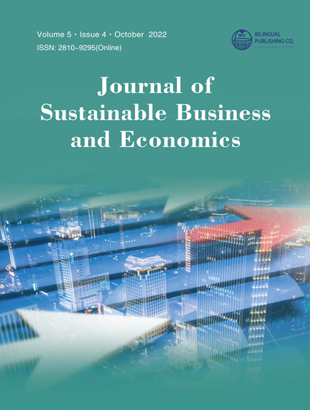-
239
-
187
-
155
-
144
-
141
Analysis of the Choice of Return Mechanism of PPP Model in Rural Human Settlement Improvement under the Rural Revitalization Strategy: Research Based on the Perspective of Evolutionary Game
DOI:
https://doi.org/10.30564/jsbe.v5i4.39Abstract
The improvement of rural human settlement environment is a significant direction of the rural revitalization strategy. Based on the finite rational evolutionary game theory, a cooperative behavior evolutionary game model of rural human settlement environment improvement PPP model with local government, social capital and rural residents as the main game players with the reward mechanism of Government Payment and one with the reward mechanism of Viability Gap Funding are constructed. Comparing the total project revenue of two reward mechanisms, the thesis will obtain the effects of choosing the reward mechanism of rural human settlement improvement PPP. Finally, available suggestions are made to the decision of the reward mechanism of PPP project about rural human settlement environment, thus promoting the application and development of PPP in rural environmental management and to promote sustainable improvement of rural habitat improvement.
Keywords:
Rural revitalization strategy; Rural human settlement environment; PPP; Reward mechanism; Evolutionary game theoryReferences
[1] Weibull, J.W., 1997. Evolutionary game theory. MIT press.
[2] Du, Y.Q., Liu, H.B., Chen, L.G., 2020. On Efficiency Difference of PPP Mode and Traditional Mode in Rural Environmental Governance: A Comparative Analysis based on Domestic Waste Disposal Cases. Journal of Nanjing Tech University (Social Science Edition). 19(01), 59-68+112.
[3] Du, Y.Q., Liu, P.Y., Wu, N.W., 2018. Can Public Private Partnership (PPP) in Rural Environmental Governance Become a New Governance Model in China? An Analysis Based on a Reality Testing on Six Cases. Chinese Rural Economy. (12), 67-82.
[4] Wang, L., Yan, D., Xiong, Y., et al., 2019. A review of the challenges and application of public-private partnership model in Chinese garbage disposal industry. Journal of Cleaner Production. 230, 219-229.
[5] Liu, X.R., Zhao, Y., 2019. An Analysis of PPP Model for Rural Habitat Environment Improvement from the Perspective of Rural Revitalization Strategy. Shanxi Agricultural Economy. (19), 28-29+31.
[6] Du, Y.Q., Wang, Y.X., Lu, W.J., 2019. Research on the Symbiotic Logic of Multiple Subjects in Rural Environmental Governance under the PPP model——Based on the Three-party Evolution Game. Journal of Huazhong Agricultural University (Social Sciences Edition). (06), 89-96+163-164. DOI: https://doi.org/10.13300/j.cnki.hnwkxb.2019.06.011
[7] Deng, Y.H., 2019. Study on Return Mechanism of PPP in Public Libraries. Library Development. (03), 85-92. DOI: https://doi.org/10.19764/j.cnki.tsgjs.20182333
[8] Grout, P.A., 2003. Public and private sector discount rates in public–private partnerships. The Economic Journal. 113(486), C62-C68.
[9] Xu, Sh.Q., Song, L.L., Liu, Sh.L., et al., 2019. Research on Reasonable Rate of PPP Project Based on Capital Asset Pricing Model. Journal of Industrial Technological Economics. 38(03), 46-51.
[10] Xu, Sh.Q., Yun, Y.T., He, J., et al., 2018. Analysis on the Current Situation and Improving Countermeasures of Rural Living Environment. Environmental Protection. 46(19), 44-48. DOI: https://doi.org/10.14026/j.cnki.0253-9705.2018.19.010
[11] Dexin, Z., Tiejun, Z., Dachuan, W., 2012. Analysis and countermeasures on rural environment pollution in Chongqing. Research Journal of Chemistry and Environment. 16, 103-107.
[12] Yan, H.D., Feng, J.Ch., 2020. Scope of application, transaction design and policy recommendations of PPP model in China’s agricultural and rural areas in the context of rural revitalization. Rural Economy. (02), 14-22.
[13] Du, Y.Q., Wu, N.W., Ding, D., et al., 2018. Study on life cycle cost of public private partnership (PPP) in rural environmental governance. China Population, Resources and Environment. 28(11), 162-170.
[14] Shen, J.Q., Shi, W.J., Wang, Ch.X., 2018. A research on the return mechanism decision of PPP project. Price: Theory & Practice. (09), 131-134. DOI: https://doi.org/10.19851/j.cnki.cn11-1010/f.2018.09.033
[15] Teng, T.L., Yuan, J.F., Li, Q.M., 2016. Case Study on the Return Mechanism of Urban Rail Transit PPP Project. Construction Economy. 37(02), 31-35. DOI: https://doi.org/10.14181/j.cnki.1002-851x.201602031
[16] Hu, Q., Wang, C., 2020. Quality evaluation and division of regional types of rural human settlements in China. Habitat International. 105, 102278.
[17] Yu, X.J., 2017. Investment and financing of agricultural and rural infrastructure based on PPP mode. China Engineering Consultants. (05), 52-53.
[18] Zou, G.L., Liu, N.N., Liang, Y.R., 2022. Game Analysis of Cooperative Behavior Evolution of the PPP Model of Rural Human Settlement Improvement under the Rural Revitalization Strategy. Operations Research and Management Science. 31(04), 61-68.
Downloads
How to Cite
Issue
Article Type
License
Copyright © 2022 Youcheng Wu, Jinhao Li, Shunli Xiao, Zhihang Zhou, Manjie Huang, Zaitian Huang, Chien Chi Chu

This is an open access article under the Creative Commons Attribution 4.0 International License.




 Youcheng Wu
Youcheng Wu

